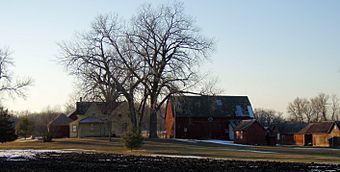Hagel Family Farm facts for kids
Quick facts for kids |
|
|
Hagel Family Farm
|
|
 |
|
| Location | Rogers, Hennepin County, Minnesota, USA |
|---|---|
| Built | 1855 |
| Architect | Hagel, Frederick; et al. |
| Architectural style | Diversified farm |
| NRHP reference No. | 06001182 |
| Added to NRHP | December 27, 2006 |
The Hagel Family Farm is a special farm located in Rogers, Minnesota. It covers about 120 acres (49 hectares). This land includes farm buildings, fields, woodlands, and wetlands. The Hagel family has owned this farm for over 150 years!
The current owner, John Hagel, helped start the Friends of Minnesota Barns group. He worked hard to get the farm listed on the National Register of Historic Places. This helps protect the farm so it stays a complete, original farmstead. In December 2006, the farm officially became a historic place.
Exploring the Farm Buildings
Most of the original buildings on the Hagel Family Farm are still standing. These include the main farmhouse where the family lived. There's also a large barn built with a special method called timber-framed mortise and tenon. This means wooden pieces fit together like a puzzle. The barn also has a milk house attached.
You can also see a two-story saltbox style granary. A granary is a building used to store grain. People believe the bricks for the farmhouse were made nearby in Dayton, Minnesota. Life on the farm was different long ago. They didn't have electricity until 1948. Before that, they used kerosene lamps for light. They also didn't have refrigerators. They kept butter and milk cool in a pit in the yard. Later, they got an icebox to keep food cold.
The Hagel Family's Journey
The Hagel family's story on this farm began with Peter and Helena Hagel. They were John Hagel's great-great-grandparents. They came from Germany and settled on 160 acres (0.65 square kilometers) of land on January 20, 1858.
Around 1890, Peter and Helena divided the farm between their two sons, Fred and Paul. Fred and Gertrude Hagel, who were John's great-grandparents, built the farmhouse that is now 117 years old. John's grandfather, Arnold, and his father, Leroy, both grew up on the farm.
Arnold Hagel passed away in 1951. His wife, Anna Hagel, continued to live on the farm until she died in 1987. Anna rented out the fields to other farmers. She also sold the animals and farm tools. Because the farm wasn't used for daily farming operations, and there was no need to update it, the buildings stayed almost the same since the 1950s.
John Hagel could have sold the land for new houses. But he wanted to save the farm as a historic site instead. This way, the farm's long history can be preserved for everyone to learn from.



